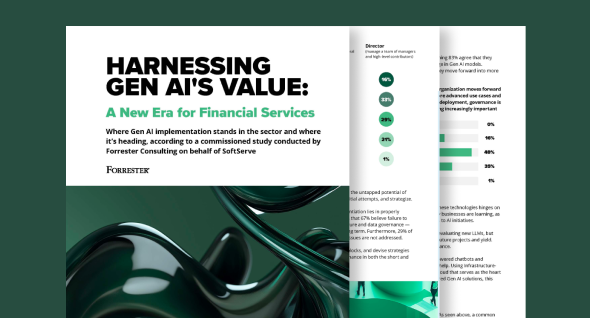
Don't want to miss a thing?
Achieve Sustainable AI Success in Europe's Financial Sector
For artificial intelligence (AI) to truly catalyze lasting change within Europe’s financial services sector, a comprehensive strategic approach is indispensable
Transforming the financial industry in Europe demands the deft application of AI. Although AI has the potential to revolutionize the financial landscape, obstacles abound. The pressing question is:

Driving innovation with Gen AI and autonomous agents
Generative AI and AI agents offer distinct advantages for the financial sector, fostering efficiency and spurring revenue growth.
Gen AI currently enables tailored product and service offerings that meet customer demands, while AI agents streamline routine tasks such as testing, document analysis, and payment processing.
Data quality and regulatory adherence: catalysts for AI success

Revamping outdated core banking systems is now a top agenda for European financial institutions. AI offers a solution to this challenge; however, regulatory requirements complicate its deployment. Implementing AI here necessitates a structured, intentional approach that starts with centralized data access, effective data governance, and enhanced data quality.
The importance of data quality stems from the fragmented IT systems and isolated data silos that financial institutions often contend with, which complicate efforts to obtain an integrated customer viewpoint.
Laying the groundwork for AI strategies in finance
Define Distinct Business Objectives
AI endeavors must correlate with clearly defined, measurable business goals. A customer-centric business case, paired with well-defined success criteria and metrics, establishes a solid foundation for progress.
Involve Business Stakeholders
Active engagement and transparency with key stakeholders build trust while preventing projects that lack coherence with the overarching business strategy from stalling in the PoC phase and failing to achieve full-scale implementation.
Automate Regulatory Compliance
Incorporating regulatory compliance within AI systems through automation ensures dependable solutions that adapt to future regulatory shifts.
Forge Technology Partnerships
Engaging with specialized technology partners fills knowledge gaps and expedites the AI rollout, especially when enhancing existing infrastructures.
Collaboration: the driving force of AI’s future
Successfully integrating AI demands alignment with business goals, a focus on compliance, robust data infrastructure, and a collaborative innovation culture.
By emphasizing these factors, financial institutions can emerge as pioneers, harnessing AI to drive operational excellence and open new growth avenues.
Of course, not everyone will progress at the same pace. How does your company compare to the competition? Learn more about AI initiatives. Learn more about the state of Gen AI progress in the financial industry in our study.

Download now!

